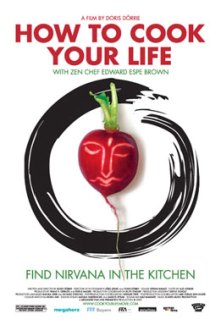 I am not a relaxed person and this tendency towards serious neurosis carries over to my time spent in the kitchen. I have mini tantrums when cupcakes get stuck in baking tins, garlic burns, or pot stickers (God forbid) actually stick to the bottom of the pan. If anyone needs a little Zen influence it would be me.
I am not a relaxed person and this tendency towards serious neurosis carries over to my time spent in the kitchen. I have mini tantrums when cupcakes get stuck in baking tins, garlic burns, or pot stickers (God forbid) actually stick to the bottom of the pan. If anyone needs a little Zen influence it would be me.
How to Cook Your Life is a documentary by filmmaker Doris Dörrie that follows Edward Espe Brown, a Zen Priest and cookbook author as he attempts to convey how the principles of Zen Buddhism apply to food preparation and your everyday life. It’s an ambitious task that takes the audience on a journey from the relative calm of the retreat kitchens, to homeless people subsisting on garbage, a woman who hasn’t bought groceries in two years and prefers “dumpster diving,” fields of migrant workers, and of course the traditional scenes of American excess consisting of mile high plates of diner pancakes and greasy cheeseburgers.
Edward Brown maintains that, “When you’re cooking, you’re not just cooking, you’re not just working on yourself, you’re working on other people. ” As a child, Edward visited his Aunt in Washington D.C. and experienced homemade bread for the first time. Prior to this he’d only ever eaten processed bread. When he returned home he asked his mother if she would teach him how to make bread, but his mother told him no, “Yeast made her nervous.” How many of us can relate to that sentiment? Eventually Brown learned how to bake and he produced the highly acclaimed cookbook, The Tassajara Bread Book.
The images of bread making in the film are amazing and lush. At times I wished that there was more time spent on the actual act of cooking food, rather than the social commentary surrounding the production and mechanization of food. Edward Brown’s style is engaging and his self-deprecating humor makes him very approachable as he easily admits to his own cooking fiascoes and typical head chef tantrums. Even going so far as to express his frustration and impatience with a particularly over packaged block of cheese by jokingly pummeling it with a spoon.
Brown also recounts a tale of making biscuits for people. He felt that they were the most amazing, healthy, natural, and delicious biscuits that you could make, but people kept telling him that they just didn’t taste “right.” So he tried dozens of variations, made with water, milk, Crisco etc…and then he realized that people were comparing the taste of his homemade biscuits to canned biscuits. Amazingly enough this was their only point of reference for baked goods: pre-packaged, processed food. So his authentic homemade breads didn’t taste familiar to people who’d grown up on McDonald’s biscuits and Pillsbury breads in a tube.
Overall, the takeaway from this film is the importance of knowing where the food you eat comes from and being mindful of the distances it must travel, the processes involved in food growth and production, and making a conscious effort to cut back on waste. There’s a disturbingly graphic and hauntingly honest description from a young boy who recounts having to butcher chickens. As I squirmed in my seat that age old question of “to be a vegetarian or not to be a vegetarian” popped into my head as I wondered if I should be eating roast chicken if I was so uncomfortable with the harsh reality of his tale? Granted this is a manipulative way to get one’s point across, but if it causes you to stop and think even for a few minutes about the choices we make about food everyday (usually with very little thought given at all), than Doris Dörrie has produced a successful message.
So to get back to that little anxiety issue I have in the kitchen…According to Master Eihei Dogen Zenji, in order to calm myself I need to “cut the carrots when I’m cutting the carrots, and wash the rice when I’m washing the rice.” In other words, slow down, and pay attention to what I’m doing while focusing on one task at a time. We’ll see about that…
How to Cook Your Life opens in theaters on October 26th, 2007.
(Originally posted on the Well Fed Network’s blog Edible TV)